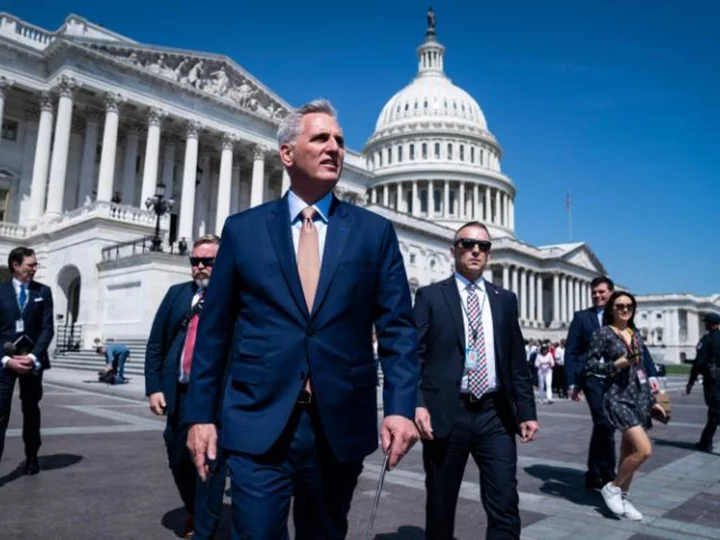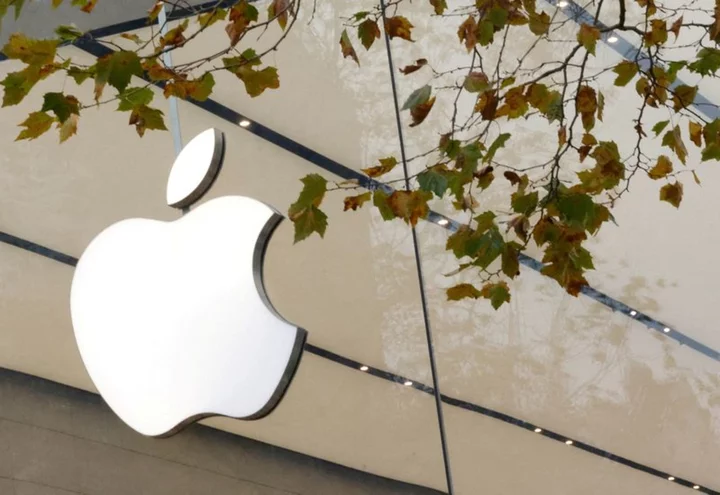House Republicans are insisting on spending cuts before they will agree to raise the nation's debt ceiling past $31 trillion.
Democrats argue Congress already spent the money and must be allowed to repay America's debt holders without an embarrassing and economically disastrous default.
President Joe Biden is returning early from a trip to Asia to restart negotiations with House Speaker Kevin McCarthy, a California Republican.
The clock is ticking down to a US default, but it's not entirely clear when the US will officially run out of cash. It's also not clear what a potential deal to avert a first-ever default will look like.
You're going to hear a lot more about this in the coming days as the country hurtles toward what previously seemed unthinkable: US lawmakers failing to agree to pay the nation's debts. Economists and government officials say it would be a financial calamity of untold proportions.
Some Republicans, flexing their majority in the House, argue the country must make tough choices regardless of the outcome. Democrats, meanwhile, are unwilling to give up some spending they enacted in 2022, when they had the majority.
The size of the debt is eye-popping, but failing to allow the government to finance its spending would send the US economy into a tailspin and ultimately endanger the Social Security and government checks on which so many millions of Americans rely.
The debt, which is largely owned by the public, pension funds, insurance companies and, to a lesser extent, foreign governments, is considered a safe form of investment and an important backbone of the economy. If America fails to pay its debt holders on time, that trust could be forever eroded.
If you haven't been following the debt drama, here are answers to some questions to get you up to speed.
When will the government run out of cash?
It's a moving target.
The US actually exceeded its borrowing authority back in January, but Treasury Secretary Janet Yellen authorized "extraordinary measures" -- essentially moving money around -- to give lawmakers time to act.
She has said those extraordinary measures will be exhausted as soon as June 1, but third-party estimates suggest it could end up taking weeks or even months longer.
The government takes in and spends money every day. It also takes cash from public debt it has sold to cover expenses.
The Treasury Department publishes a daily balance sheet. Last Thursday it showed an operating cash balance of $57 billion, including billions in deposits -- everything from income taxes and Medicare premiums to the foreign military sales program -- and $205 billion in cash from debt.
CNN's Tamy Luhby writes that if the US can limp to the middle of June, an expected infusion of estimated tax payments could forestall the so-called X date until later in the summer. Treasury officials might not even know until a day or two before the X date occurs.
When will Congress get serious?
In April, House Republicans passed a bill to raise the debt ceiling paired with nonspecific requirements for spending cuts, to undo climate change-related spending championed by Democrats and to impose new federal work requirements for Medicaid recipients, among other things.
The one-sided bill was a nonstarter for Democrats, who ignored it in the Senate. But it proved that Republicans could come together and was seen as a sort of opening bid in negotiations.
Those negotiations really got underway in early May, when McCarthy and Biden met at the White House.
Staff-level discussions between the White House and congressional Republicasn resumed Sunday evening after Biden and McCarthy had spoken by phone in the afternoon, according to a White House official. Biden and McCarthy will meet on Monday, the official added.
Is cutting spending the only way to address the debt?
No. Just as Democrats are generally opposed to spending reductions, Republicans are generally opposed to raising taxes. Along with the growth in government spending, the cutting of tax rates plays an important role in this story.
When would a default start to really hurt?
Nearly every economist and policy maker agrees that a sustained default would have catastrophic consequences for the US economy and for the many millions of Americans who rely on Social Security, Medicare, government paychecks or government help.
The stock market could lose a large portion of its value if investors were spooked by the instability.
But a default of a day or two might not seem quite as horrible, particularly if there were not any interruption in government services.
Related: Here's how we know a US default would be an economic disaster
What would happen immediately after default?
Any default would have consequences. If investors no longer trusted the US government to pay its bills, the cost of the government borrowing money could rise -- particularly if credit-rating agencies downgrade America's sterling credit rating. That's what happened in 2011 in the lead-up to the last significant debt ceiling standoff, increasing the amount America had to pay to make good on its debt obligations.
Some Republicans have already suggested that a short-term default would not be catastrophic.
It's not entirely clear if Social Security payments would be immediately delayed.
The Treasury Department would have to make difficult choices about which bills to pay. It has not outlined a specific plan for what happens after a default.
The consequences would cascade and compound as a default continued.
Related: 5 ways a debt default could affect you
If the White House and Republican leaders announce a deal, is that the end of it?
No. And this is a very important point. Any deal announced by the negotiators must pass in the House and the Senate. That takes time, which is why a deal must be reached before June 1 in order to avoid a June 1 X date. McCarthy had argued that this past weekend was the real, functional deadline.
There's also a very real question about whether House Republicans will coalesce around whatever deal McCarthy makes.
His position as speaker is tenuous and if he agrees to a bill that Democrats find acceptable, he could face a revolt among conservative Republicans. Whatever passes through the House will have to get support from most Republicans there.
Are there other options?
The debt limit exists because of laws that date back to the 1930s. There's a compelling argument that subsequent legislation -- the Budget Act of 1974 -- gave Congress specific power over the federal budget and made the debt ceiling duplicative, essentially negating it.
But that's an untested legal theory. For now, Republicans will get two opportunities to enact cuts, with the debt ceiling and in normal order of passing a budget and spending bills.
What about the 14th Amendment?
Democratic senators, former President Bill Clinton and some notable legal experts have argued Biden has the power to raise the debt ceiling on his own if he chooses.
This more-discussed end run around the standoff is for Biden to simply invoke the 14th Amendment, ratified in 1868, and order the Treasury Department to carry on with financing the spending Congress has already authorized.
Section 4 of the 14th Amendment reads: "The validity of the public debt of the United States, authorized by law, including debts incurred for payment of pensions and bounties for services in suppressing insurrection or rebellion, shall not be questioned."
While Biden has not rejected the idea of invoking the 14th Amendment, he has said that since that pathway is also untested in courts, there is no time to do it for this standoff. Read more about the 14th Amendment and the debt.
When will Wall Street freak out about all of this?
Not yet, apparently.
Market experts think a default will break the financial system. But the immediate reaction could be muted if investors can't identify a safer option for treasuries.









